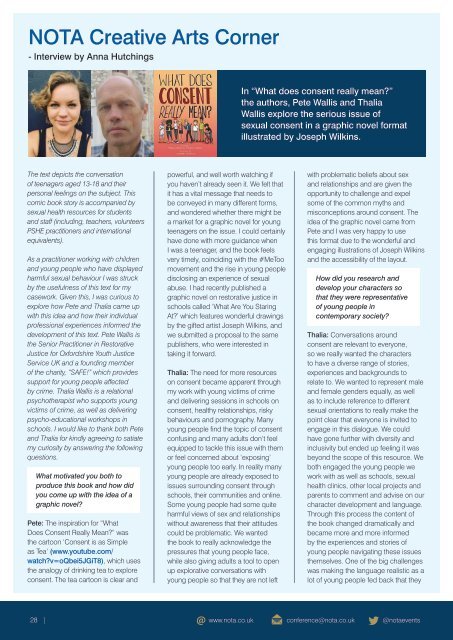NOTA News Newsletter July 2018 1
Create successful ePaper yourself
Turn your PDF publications into a flip-book with our unique Google optimized e-Paper software.
<strong>NOTA</strong> Creative Arts Corner<br />
- Interview by Anna Hutchings<br />
In “What does consent really mean?”<br />
the authors, Pete Wallis and Thalia<br />
Wallis explore the serious issue of<br />
sexual consent in a graphic novel format<br />
illustrated by Joseph Wilkins.<br />
The text depicts the conversation<br />
of teenagers aged 13-18 and their<br />
personal feelings on the subject. This<br />
comic book story is accompanied by<br />
sexual health resources for students<br />
and staff (including, teachers, volunteers<br />
PSHE practitioners and international<br />
equivalents).<br />
As a practitioner working with children<br />
and young people who have displayed<br />
harmful sexual behaviour I was struck<br />
by the usefulness of this text for my<br />
casework. Given this, I was curious to<br />
explore how Pete and Thalia came up<br />
with this idea and how their individual<br />
professional experiences informed the<br />
development of this text. Pete Wallis is<br />
the Senior Practitioner in Restorative<br />
Justice for Oxfordshire Youth Justice<br />
Service UK and a founding member<br />
of the charity, “SAFE!” which provides<br />
support for young people affected<br />
by crime. Thalia Wallis is a relational<br />
psychotherapist who supports young<br />
victims of crime, as well as delivering<br />
psycho-educational workshops in<br />
schools. I would like to thank both Pete<br />
and Thalia for kindly agreeing to satiate<br />
my curiosity by answering the following<br />
questions.<br />
What motivated you both to<br />
produce this book and how did<br />
you come up with the idea of a<br />
graphic novel?<br />
Pete: The inspiration for “What<br />
Does Consent Really Mean?” was<br />
the cartoon ‘Consent is as Simple<br />
as Tea’ (www.youtube.com/<br />
watch?v=oQbei5JGiT8), which uses<br />
the analogy of drinking tea to explore<br />
consent. The tea cartoon is clear and<br />
powerful, and well worth watching if<br />
you haven’t already seen it. We felt that<br />
it has a vital message that needs to<br />
be conveyed in many different forms,<br />
and wondered whether there might be<br />
a market for a graphic novel for young<br />
teenagers on the issue. I could certainly<br />
have done with more guidance when<br />
I was a teenager, and the book feels<br />
very timely, coinciding with the #MeToo<br />
movement and the rise in young people<br />
disclosing an experience of sexual<br />
abuse. I had recently published a<br />
graphic novel on restorative justice in<br />
schools called ‘What Are You Staring<br />
At?’ which features wonderful drawings<br />
by the gifted artist Joseph Wilkins, and<br />
we submitted a proposal to the same<br />
publishers, who were interested in<br />
taking it forward.<br />
Thalia: The need for more resources<br />
on consent became apparent through<br />
my work with young victims of crime<br />
and delivering sessions in schools on<br />
consent, healthy relationships, risky<br />
behaviours and pornography. Many<br />
young people find the topic of consent<br />
confusing and many adults don’t feel<br />
equipped to tackle this issue with them<br />
or feel concerned about ‘exposing’<br />
young people too early. In reality many<br />
young people are already exposed to<br />
issues surrounding consent through<br />
schools, their communities and online.<br />
Some young people had some quite<br />
harmful views of sex and relationships<br />
without awareness that their attitudes<br />
could be problematic. We wanted<br />
the book to really acknowledge the<br />
pressures that young people face,<br />
while also giving adults a tool to open<br />
up explorative conversations with<br />
young people so that they are not left<br />
with problematic beliefs about sex<br />
and relationships and are given the<br />
opportunity to challenge and expel<br />
some of the common myths and<br />
misconceptions around consent. The<br />
idea of the graphic novel came from<br />
Pete and I was very happy to use<br />
this format due to the wonderful and<br />
engaging illustrations of Joseph Wilkins<br />
and the accessibility of the layout.<br />
How did you research and<br />
develop your characters so<br />
that they were representative<br />
of young people in<br />
contemporary society?<br />
Thalia: Conversations around<br />
consent are relevant to everyone,<br />
so we really wanted the characters<br />
to have a diverse range of stories,<br />
experiences and backgrounds to<br />
relate to. We wanted to represent male<br />
and female genders equally, as well<br />
as to include reference to different<br />
sexual orientations to really make the<br />
point clear that everyone is invited to<br />
engage in this dialogue. We could<br />
have gone further with diversity and<br />
inclusivity but ended up feeling it was<br />
beyond the scope of this resource. We<br />
both engaged the young people we<br />
work with as well as schools, sexual<br />
health clinics, other local projects and<br />
parents to comment and advise on our<br />
character development and language.<br />
Through this process the content of<br />
the book changed dramatically and<br />
became more and more informed<br />
by the experiences and stories of<br />
young people navigating these issues<br />
themselves. One of the big challenges<br />
was making the language realistic as a<br />
lot of young people fed back that they<br />
28 | www.nota.co.uk conference@nota.co.uk @notaevents





